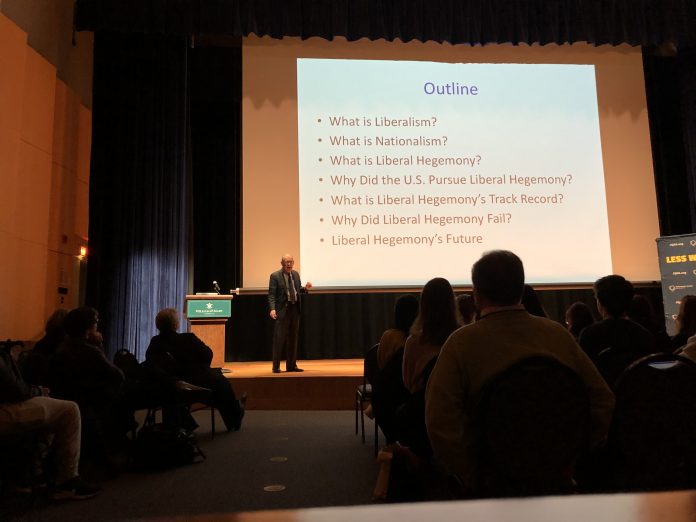
Thursday, Feb. 27, the John Quincy Adams Society and the Global Research Institute welcomed esteemed political scientist and author John Mearsheimer to the College of William and Mary. In his presentation, Mearsheimer discussed both his ideologies and his new book, “The Great Delusion: Liberal Dreams and International Realities,” which covers liberal hegemony and the role of the United States in establishing its control on the world.
Known for his advocation for political realism, a theory that examines the role of rational actors in world politics, Mearsheimer discussed the political lens in the context of his new book, which deals with American foreign policy in the post-Cold War period and the U.S. pursuit of liberal hegemony after the war by attempting to remake the world in America’s image.
“My argument is that the reason liberal hegemony failed is that this liberal foreign policy ran up against two other -isms: nationalism and realism,” Mearsheimer said.
Mearsheimer explained that the goal of liberal hegemony is to spread liberal democracy across the planet and integrate more countries into the open international economy and international institutions. Although in theory, liberal hegemony intends to better the world by eliminating human rights violations and creating a more peaceful world, Mearsheimer argued that it has unintentional consequences.
He discussed how trying to instill democratic ideas in foreign nations is much more difficult and hazardous than expected and sometimes can cause more harm than good.
“Once you’re there, you have to do social engineering to replace that regime; especially with liberal democracy, you become an occupier,” Mearsheimer said. “What happens is you fuel nationalism. You get huge resistance. … We used to say it was liberal democracy fighting communism … but we were against nationalism.”
He carried on saying that liberal hegemony was thought to be easy in concept because universally citizens in foreign nations would want more rights. However, the U.S., in his opinion, has been overselling this idea in assuming individual rights are a top priority of other nations.
“In countries like Iraq, they’re not worried about individual rights; they’re worried about getting some stability,” Mearsheimer said. “All this to say, it’s a harder sell than anticipated.”
Mearsheimer ended his talk with his own predictions for the future of the nation. He explained that after the Cold War the world experienced unipolarity where there was the existence of a singular predominant nation, the U.S. However, now the world is beginning to experience multipolarity due to the rise of power in China and Russia.
“When you only have one great power in the system, it’s a very different world than when you have two great powers,” Mearsheimer said. “And the world we’re moving into now, with three great powers, could be very different.”
“When you only have one great power in the system, it’s a very different world than when you have two great powers,” Mearsheimer said. “And the world we’re moving into now, with three great powers, could be very different.”
Mearsheimer also gave a foreboding message to the audience, arguing that the change in the U.S. status as the biggest and strongest power to a shared center-stage would prove to cause new problems and a shift in how the world is viewed.
“When you live in a bipolar world or a multipolar world, the United States, or the great powers for that matter, have to engage in basic ‘realpolitik’, balance of power politics,” Mearsheimer said. “You have no choice. In unipolarity, that’s not true. The world you were born into, the world you grew up in, it’s going away. We’re going to live in a very different world.”
“When you live in a bipolar world or a multipolar world, the United States, or the great powers for that matter, have to engage in basic ‘realpolitik’, balance of power politics,” Mearsheimer said. “You have no choice. In unipolarity, that’s not true. The world you were born into, the world you grew up in, it’s going away. We’re going to live in a very different world.”
All in all, many students found the lecture interesting and well-conducted. Rustin Abedi ’22 thought Mearsheimer did a good job explaining the role of the U.S. in attempting to establish a liberal hegemony.
“It was a very good lecture,” Abedi said. “He’s a very engaging speaker. I found it very hard to ever be dulled or bored. The presentation was very structured, and it made a lot of sense what his conclusions are and what he was trying to display about liberal hegemony.”
In addition to his lecture, Mearsheimer also opened the floor to the approximately 350 people in attendance for a question-and-answer segment.
The event concluded with a reception where students and attendees alike could purchase Mearsheimer’s book, get pictures with him and ask him questions more personally. Sophia Kruk ’23 described the evening as a “unique experience,” particularly because she has read Mearsheimer’s work in some of her classes.
“We’ve read his stuff and analyzed what he’s said and made arguments and counterarguments about the logic and validity of what he says,” Kruk said. “Now, we can even ask him questions personally and hear what he has to say.”
